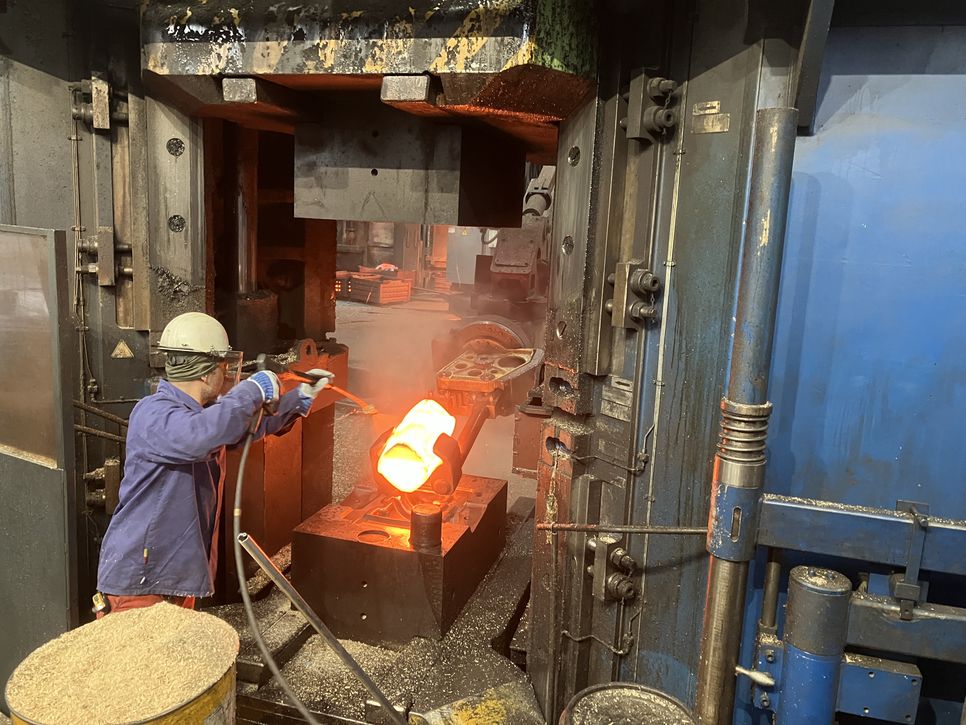
Hagen, November 6, 2023
New forging hammer combines state-of-the-art technology with higher impact force
Schmiedag GmbH will invest around 7 million euros in its forging hammer plant as it seeks to improve its carbon footprint and make its production more reliable.
With an investment of around 7 million euros, Schmiedag GmbH will increase manufacturing reliability at its forging hammer plant and expand both its production capacity and its product portfolio. At the heart of this investment is the acquisition of a new stretching press that produces a pressure of 630 tons, and the installation of a 400 kJ forging hammer (DG 40 counterblow hammer). The plant will now be able to forge components with a unit weight of up to 750 kg. Previously, a unit weight of 450 kg was the maximum. This will enable Schmiedag to expand its range of heavier components and address new markets that were previously technologically inaccessible. This applies, for example, to special applications in the food industry, which continue to grow strongly, components for modern power generation engines, and components for large mining machinery.
“Thanks to the circular arrangement of our new hammer plant and to the new stretching press, we are now much more flexible, and more efficient practices at the plant will allow us to significantly improve CO2 emission values,” says Schmiedag Managing Director Heinz Klenen.
In Schmiedag’s forging process, the steel ingots are first heated up to 1,280 degrees Celsius in a furnace, then removed by one of two parallel-operating grippers (“andromats”) controlled by specially trained operators. The steel ingots are then fed one after the other into the circular presses and forging hammers, depending on what final shape is desired. The two new aggregates have now been added to this hammer plant.
Preparing the forging hammer’s installation site within the existing hammer plant was a particular challenge in this project. In order to create a suitable foundation, a bored pile wall first had to be constructed ahead of excavating the building pit. This required 42 boreholes with a diameter of 90 centimeters and a drilling depth of 14 meters. Once the pit had been excavated, a 500-ton foundation block was installed for the base plate of the forge hammer. All of this was done while the existing hammer continued to operate, in order to allow the servicing of existing customer orders.
Occupational safety was also increased with a number of structural and technical measures that include an automated shutdown when the plant is entered.
About Schmiedag GmbH
Schmiedag GmbH, based in Hagen, North Rhine-Westphalia, produces medium to large-size closed-die forgings for large engines, the railway and power generation industry as well as special vehicles. The company is part of GMH Gruppe and supplies safety-critical and other components made of low- to high-alloy steels, most of which are sourced from within the group, resulting in a low carbon footprint. Solutions from Schmiedag range from forged blanks to semi-machined and painted and ready-to-install components.
About GMH Gruppe
GMH Gruppe is a full-range supplier of recycled input material through ready-to-install components and one of the largest privately owned metalworking companies in Europe. The Gruppe comprises 20 medium-sized production companies in the steel, forging and casting industry and is present in more than 50 countries. With around 6,000 employees, the GMH Gruppe generated annual sales of around two billion euros in 2021. GMH Gruppe is a pioneer in sustainable steel production and has also been accepted into the “Association of Climate Protection Companies”. By recycling scrap metal, the company produces green steel and thus makes an important contribution to the circular economy. The use of electric arc furnaces at four of its sites reduces carbon dioxide emissions by a factor of five compared with conventional blast furnaces. This, in turn, also reduces the carbon footprint of GMH’s customers. Global customers include companies from the automotive industry, mechanical and plant engineering, railroad technology, power generation, transport logistics as well as the sectors, aerospace, agriculture and construction machinery. The GMH Gruppe has set itself the goal of being completely climate-neutral by 2039.